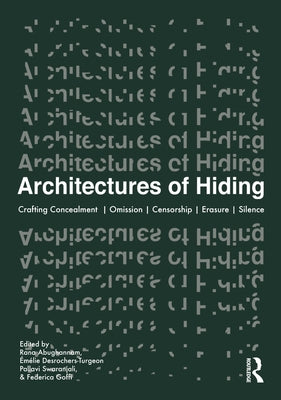Before you leave...
Take 20% off your first order
20% off
Enter the code below at checkout to get 20% off your first order
Discover summer reading lists for all ages & interests!
Find Your Next Read

Architecture manifests as a space of concealment and unconcealment, lethe and al黎heia, enclosure and disclosure, where its making and agency are both hidden and revealed. With an urgency to amplify narratives that are overlooked, silenced and unacknowledged in and by architectural spaces, histories and theories, this book contends the need for a critical study of hiding in the context of architectural processes. It urges the understanding of inherent opportunities, power structures and covert strategies, whether socio-cultural, geo-political, environmental or economic, as they are related to their hidescapes - the constructed landscapes of our built environments participating in the architectures of hiding.
Looking at and beyond the intentions and agency that architects possess, architectural spaces lend themselves as apparatuses for various forms of hiding and un(hiding). The examples explored in this book and the creative works presented in the interviews enclosed in the interludes of this publication cover a broad range of geographic and cultural contexts, discursively disclosing hidden aspects of architectural meaning. The book investigates the imaginative intrigue of concealing and revealing in design processes, along with moral responsibilities and ethical dilemmas inherent in crafting concealment through the making and reception of architecture.
Rana Abughannam is assistant professor at the School of Architecture and Landscape Architecture, University of British Columbia. She taught at Carleton University, the Canadian University Dubai and Birzeit University. She is a registered architect in Palestine with a degree in architectural engineering (Birzeit University) and a master of history and theory of architecture (McGill University). Her doctoral research (Carleton University) focuses on counter-colonial practices in Palestine.
ノm鑞ie Desrochers-Turgeon is assistant professor at the Dalhousie University School of Architecture. Her research areas include the relationship between built environments and grounds through material fictions, architectural representation, extractive infrastructures and liquid landscapes. Educated professionally in architecture (McGill University) and environmental design (UQAM), she practiced design in Canada and Germany before pursuing her PhD in architecture at Carleton University.
Pallavi Swaranjali is program coordinator and professor in the Bachelor of Interior Design program, Algonquin College, Ottawa. She holds a PhD in architecture (Azrieli School of Architecture and Urbanism, Carleton University), a BA in architecture and an MDesign in industrial design from India, where she also practiced. She is an intern architect with the Ontario Association of Architects. Her research centers on architecture and storytelling.
Federica Goffi is professor of architecture, and co-chair of the architecture PhD Program at the Azrieli School of Architecture and Urbanism at Carleton University, Canada. She published on architectural representation and the role of time in architecture. She holds a PhD in architecture and design research (Virginia Tech), a Dottore in Architettura (University of Genoa), and is a licensed architect in her native country, Italy.
Thanks for subscribing!
This email has been registered!
Take 20% off your first order
Enter the code below at checkout to get 20% off your first order